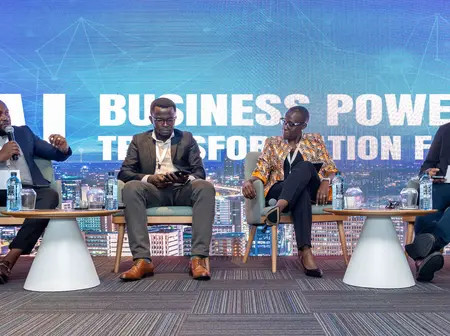The opening moments made it clear that this wasn’t going to be another polite showcase of futuristic technology. Organisers stressed that AI adoption in Kenya should be defined by utility and responsibility, not slogans or imported narratives. That framing stayed consistent throughout the day — and the audience held each speaker to it.
Annepeace Alwala of Sama brought forward the ethical layer of AI development, focusing on data sourcing and workforce impact. Rather than simply presenting principles, she was met with pressing questions from attendees on how ethical guarantees can be verified and who is accountable when AI systems fail. The conversation quickly shifted from theory to enforcement, reinforcing a recurring theme — transparency is now expected, not requested.
Samsung’s Ryan Mule presented live demonstrations of Knox-powered mobile workflows, positioning smartphones as full-scale productivity tools rather than communication devices. The audience response was immediate. Concerns around data security, BYOD (Bring Your Own Device) risks, and corporate accountability surfaced instantly. It became clear that businesses in the room were not just excited by AI — they were already trying to deploy it at scale, and needed clarity more than inspiration.
Alfred Ongere of AI Kenya delivered a direct challenge — AI adoption in Africa is not constrained by access or affordability, but by hesitation. The audience received this as intended. Several SME representatives questioned whether internal resistance and legacy workflows were bigger barriers than budgets. The session turned from presentation to group reflection, with multiple professionals sharing ongoing struggles in convincing leadership teams to support experimentation.
A live podcast-style panel featuring Annepeace (Sama), Ryan (Samsung), and Alfred (AI Kenya) centered on access and responsibility. Here again, the room took ownership of the narrative. Questions ranged from:
“How do we prevent AI tools from reinforcing existing inequalities?”
“What happens when public excitement outpaces policy safeguards?”
The consensus wasn’t utopian. Kenya is not waiting for perfect regulation — it is actively building bottom-up governance through shared expectations between developers, businesses, and users.
itel’s Ryan and Daniel Kamande drew one of the most grounded responses of the day. When the subject shifted from flagship devices to sub-$100 smartphones with AI capability, the room leaned forward. Instead of discussing innovation abstractly, itel anchored it in battery-saving AI features, safety-first charging design, and camera intelligence for low-resource environments.
One comment from Ryan — “AI will change Africa when someone in rural Kenya can use it on their own device” — landed with visible approval across the audience.
Lawyer and AI governance strategist Benta Kamau took a different approach — grounding AI policy in risk, liability and operational practicality. She walked attendees through the unseen side of AI adoption: environmental compliance, data center legality, chip sourcing, copyright exposure, and child safety policies in generative models.
Unlike typical legal talks, this session was met with urgency rather than fatigue. Several professionals pressed for templates, audit guides, and implementation pathways — indicating that companies are no longer asking whether regulation matters, but how to comply before problems escalate.
The closing conversation with Daniel (itel), Benta, and Joseph Henry Okar, framed as a podcast dialogue, landed on a critical point — AI cannot be considered inclusive if it remains confined to corporate venues.
The audience echoed it strongly. Implementation must expand beyond conference halls into classrooms, factories, community spaces, and rural networks. Kenya is ready for AI — but only if adoption models are structured to meet people where they already are.
The TechTrends AI Forum in Nairobi was designed as a business transformation event, but it unfolded more like a working lab. Across every session, attendees weren’t silent observers — they were active participants. Questions came fast, challenges were voiced openly, and real-world concerns often redirected speaker narratives. Instead of speakers talking at the room, every presenter found themselves talking with it.
The day ended not with speeches but acknowledgements. The awards segment honored organisations already translating AI and digital innovation into measurable impact.
The applause suggested something important — the room wasn’t just impressed by ideas, but by execution.
The TechTrends AI Forum wasn’t framed as a moment of arrival or disruption. It represented something more grounded — a country already actively negotiating how AI should work, who it should work for, and what risks must be addressed before scale.
Vendors came with solutions. Experts came with frameworks. The audience came with questions — and refused to leave them unanswered.
If this is how AI is being discussed in Nairobi today, its future in Kenya won’t be shaped by hype cycles or imported rhetoric. It will be shaped by use, scrutiny, accountability, and collective pressure to make technology work for everyone.

Leave a Reply